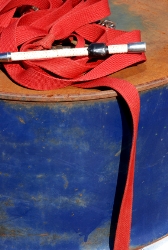On the second anniversary of the Deepwater Horizon blowout, a national panel of researchers including University of Georgia marine scientist Samantha Joye is urging the federal government to reassess how it would respond to similar oil spills that might occur in the future.
U.S. commercial building owners could save an average of 38 percent on their heating and cooling bills if they installed a handful of energy efficiency controls that make their heating, ventilation and air conditioning, also known as HVAC, systems more energy efficient, according to a recent report from the Department of Energy's Pacific Northwest National Laboratory.
Survey of Over 100 Solar Manufacturers Reveal Current Environmental, Worker Safety, and Fiduciary Considerations
Achievable standard is in line with investments already being made and will inform the building of new plants moving forward.
Scientists are preparing to launch a 10-year project to study water resources, gas exchange and carbon cycling in three man-made landscapes built in a half-acre laboratory at the University of Arizona’s Biosphere 2.

The infamous winds that gust through downtown San Francisco streets, overturning kiosks and sometimes toppling pedestrians, will help to power a revolutionary skyscraper set to open next fall -- and could pave the way for a new world market for energy-generating wind turbines in new buildings.

Hard water hasn’t been medically tied to health issues, but its high mineral contents can lead to serious infrastructure breakdowns. However, one Alabama town aims to alleviate its water hardness once and for all.

How can the largest university in Dallas-Fort Worth, Texas, lead the pack in sustainability? Build a green football stadium, of course.
Researchers with the Sierra Nevada Research Institute (SNRI) at the University of California, Merced, have received a $2 million grant from the National Science Foundation to expand on a prototype system that uses a network of wireless sensors to track snowpack depth, water storage in soil, stream flow, and water use by vegetation in the Sierra — information that is key to efficient usage of such a scarce resource.
Merck failed to take necessary preventative measures and follow reporting requirements under federal environmental regulations.
A research team led by LSU professors Fernando Galvez and Andrew Whitehead has published the results of a combined field and laboratory study showing the effects of the Deepwater Horizon oil spill on fish living in Louisiana marshes.
The black smoke that rose from the water’s surface during the controlled burns pumped more than 1 million pounds of black carbon (soot) pollution into the atmosphere, according to a new study published last week by researchers at NOAA and its Cooperative Institute for Research in Environmental Sciences (CIRES) in Boulder, Colo.
The report identifies best practices and makes recommendations to help save more lives during future violent tornadoes. Most importantly, the assessment emphasizes that people must be prepared to take immediate action when a warning is issued.
EPA Region 10 issued final air quality permits to Shell on Sept. 19 for oil and gas exploration drilling in the Alaska Arctic. The permits will allow Shell to operate the Discoverer drillship and a support fleet of icebreakers, oil spill response vessels, and supply ships for up to 120 days each year in the Chukchi Sea and Beaufort Sea Outer Continental Shelf starting in 2012.
A new study by researchers at the Johns Hopkins Center for Injury Research and Policy finds that helicopters that service the drilling platforms and vessels in the Gulf of Mexico crash on average more than six times per year resulting in an average of five deaths per year.
From funding smart meters on college campuses, to reducing hazardous chemicals in high school laboratories, to promoting alternatives to dry cleaning, the U.S. Environmental Protection Agency (EPA) is making its pollution prevention grants count across New Jersey and New York. The EPA has awarded more than $600,000 in grants to fund projects that help prevent pollution in these two states.
The new UNTHA Recycling Technology (URT) system at the Appliance Recycling Centers of America (ARCA)’s facility in Philadelphia is ready to begin recycling as many as 150,000 refrigerators annually, GE and ARCA announced Sept. 9.
In a detailed assessment of the Deepwater Horizon oil spill, researchers led by a team from the Woods Hole Oceanographic Institution (WHOI) have determined that the blown-out Macondo well spewed oil at a rate of about 57,000 barrels a day, totaling nearly 5 million barrels of oil released from the well between April 20 and July 15, 2010, when the leak was capped. In addition, the well released some 100 million standard cubic feet per day of natural gas
Output from the 10-megawatt AC project on 80 hectares of cleared land 50km southeast of Geraldton will contribute to offsetting the energy requirements of the Southern Seawater Desalination Plant.

When many people think of industrial chemicals, they think of those scary-looking yellow drums, containing unknown but almost certainly hazardous goo. A new industry initiative, though hopes to change that by giving consumers more information on the chemicals they use every day.